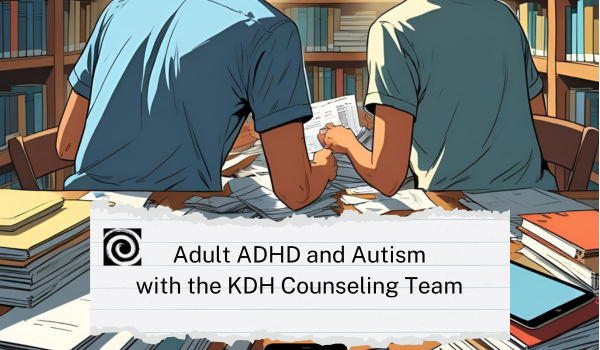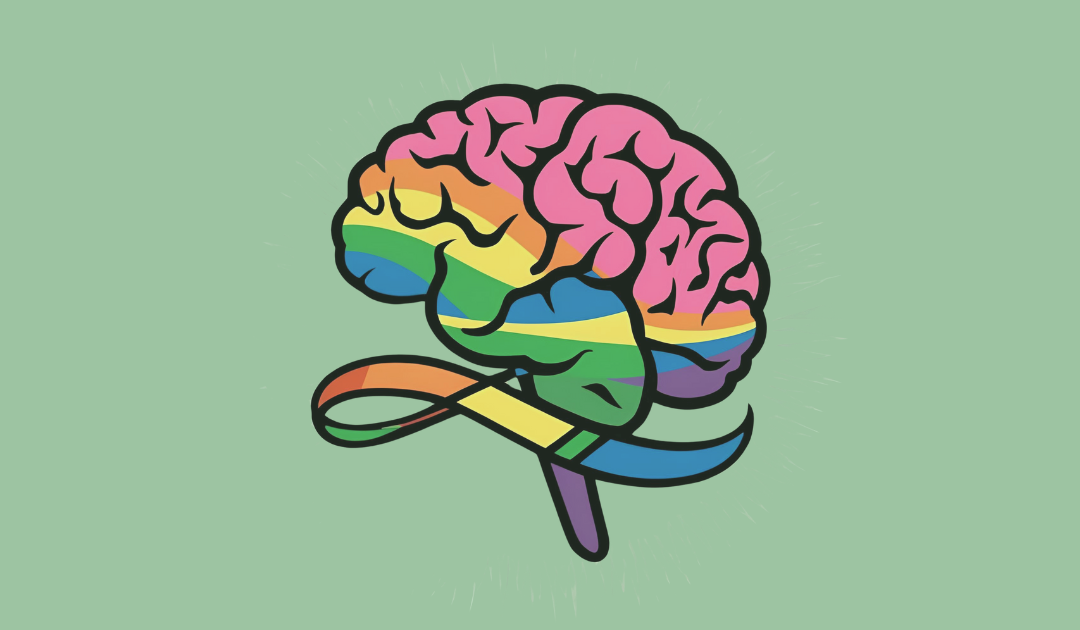ADHD and Autism Two Ways: Evaluations and Assessments
In recent years, more adults are seeking answers to questions they’ve carried with them for decades, even if they only recently found the language...
5 min read
KDH Counseling Team : Jul 25, 2025 10:48:23 AM

Attention-Deficit/Hyperactivity Disorder (ADHD) is often mischaracterized—reduced to images of fidgety schoolchildren or distracted professionals with overflowing calendars. But the lived experience of ADHD is far more nuanced. For many adults, it shows up not just in attention lapses, but in chronic overwhelm, emotional intensity, difficulty initiating tasks, and a relentless internal narrative of frustration and shame.
Often, individuals seeking a psychological evaluation for ADHD are not merely seeking a diagnosis. They are seeking understanding. Validation. Language to explain years of struggle. For clinicians, this evaluation is more than a procedural task—it’s an invitation to witness, contextualize, and empower.
This blog outlines what a comprehensive psychological evaluation for adult ADHD entails, why it matters, and how it can be a pivotal step toward greater insight and self-compassion.
Many adults present for ADHD evaluation after years of confusion. They may be successful on the outside but feel like they are always internally scrambling. Others have experienced academic challenges, difficulty sustaining employment, or intense emotional reactivity that doesn’t align with their effort or intellect.
A psychological evaluation begins with this uncertainty. The referral question—Could this be ADHD?—opens the door to a much deeper exploration of cognitive functioning, emotional regulation, trauma history, executive functioning, and self-perception.
This process does not seek to reduce complexity but to better understand it. And for many clients, it offers their first experience of being fully seen.
In clinical terms, a psychological evaluation for ADHD is a structured assessment process led by a licensed psychologist to determine whether an individual meets diagnostic criteria for ADHD (as defined by the DSM-5-TR) and/or any co-occurring conditions. This process is both evidence-based and person-centered.
The core components typically include:
Clinical interviews (developmental, psychosocial, and diagnostic)
Standardized cognitive testing
Behavioral symptom inventories
Attention-specific performance tasks
Review of collateral data (e.g., academic records, family reports) when available
While every evaluation is tailored to the individual, the aim is the same: to identify the underlying factors contributing to a person’s difficulties and to clarify what supports, treatments, or accommodations might be most effective.
The process often begins with a 60–90 minute intake session. This is not simply about reviewing symptoms—it’s about hearing the client’s story.
What has their educational journey looked like?
Were there signs of attentional difficulties in childhood?
How are they functioning now—in work, relationships, daily life?
What coping strategies have they developed, and at what cost?
What emotional themes emerge (e.g., shame, anxiety, fear of failure)?
This interview is essential not just for diagnostic clarity but for establishing trust. It allows the clinician to situate symptoms within the client’s broader life context.
Once the clinical history has been collected, formal testing is typically administered. This may include:
Cognitive testing to assess working memory, processing speed, and executive functioning. This is likely to include assessments like the Weschler Adult Intelligence Scale (WAIS-5), which gives an overview of cognitive strengths and deficits based on comparing a person's results to what is considered to be "typical" for their age, gender, race/ethnicity, etc. While intelligence is right there in the title, the WAIS-5 is giving the psychologist a snapshot of a person's thinking and processing experiences, and not a wholistic view of what we consider true intelligence to be. The results of this type of assessment provide one piece of a very varied exploration of someone's internal and external functioning.
Continuous Performance Tests (CPTs) to evaluate sustained attention and impulsivity. These are often completed on a computer, and will provide information about how someone's brain is able (or not) to complete difficult and/or laborious tasks.
Behavioral rating scales such as the Conners Adult ADHD Rating Scales (CAARS), Barkley Adult ADHD Rating Scale (BAARS-IV), or Adult ADHD Self-Report Scale (ASRS), completed by the client and potentially a close observer (partner, family member). These give ADHD-specific data points to the psychologist, not only from the perspective of someone close to the client, but also from the client's perspective, as well. While appearing to others as if they function "normally" and often very successfully, many adults expend intense energy and effort behind the scenes that only they would be aware of. Getting behavioral data from both the client and someone who knows them well will ensure that there is nothing missed due to the coping and self-accommodating that many undiagnosed ADHDers use in order to appear "normal."
Emotional and behavioral assessments to screen for co-occurring conditions like anxiety, depression, trauma, or autism spectrum characteristics. Since there is great overlap between the symptoms and experiences of ADHD, anxiety and depressive disorders, previous trauma exposure, and autism, it is essential to consider these possible explanations for potential causes/influences on functioning difficulties.
These tools offer valuable data points, but they are not interpreted in isolation. The most important insights arise from the patterns across multiple sources: what the tests reveal, what the client describes, and what the clinical context suggests. This is the benefit of a true psychological evaluation above and beyond what someone might experience in being assessed by other types of mental health professionals.
Not every attentional difficulty is ADHD. Adults experiencing trauma, high levels of anxiety, burnout, depression, or sensory processing issues may present with similar challenges.
This is where the diagnostic process becomes more art than algorithm. A skilled clinician integrates findings holistically, weighing factors such as:
Onset and duration of symptoms (e.g., lifelong vs. acquired)
Consistency across settings
Emotional regulation patterns
Masking or compensation strategies
Sociocultural and neurodivergent identities
In many cases, ADHD is present alongside other diagnoses. In others, symptoms may be better explained by complex trauma, autistic burnout, or executive dysfunction secondary to chronic stress. A well-conducted evaluation makes space for all of these possibilities.
Once testing is complete, the psychologist provides a feedback session to review results, answer questions, and discuss recommendations.
This is one of the most meaningful parts of the process. Clients often feel deeply validated as they finally receive a framework for experiences they’ve struggled to name. Others may feel grief—mourning lost time, misunderstood potential, or years of internalizing blame.
An effective feedback session balances clinical clarity with emotional attunement. It is not just about delivering scores. It’s about returning the client’s story with greater coherence and context.
While some providers offer brief ADHD screenings (e.g., 30–60 minute interviews plus symptom checklists), these are not sufficient for most adults. They may overlook co-occurring diagnoses, misattribute symptoms, or fail to differentiate ADHD from trauma or other neurodivergent conditions.
A comprehensive evaluation, in contrast, provides:
Diagnostic clarity that accounts for comorbidities and complexity
Documentation that supports academic or workplace accommodations
Clinical recommendations tailored to the individual (e.g., therapy, medication, coaching, environmental strategies)
Language that empowers the client to advocate for themselves
This level of assessment also helps prevent misdiagnosis, which is especially important given the growing overlap in presentations between ADHD, autism, PTSD, and sensory processing disorders.
In clinical practice, ADHD rarely exists in isolation. Adults being evaluated may also experience:
Generalized or social anxiety
Depression or dysthymia
PTSD or complex trauma histories
Rejection Sensitive Dysphoria (RSD)
Autistic traits
Executive dysfunction secondary to stress or burnout
Sensory sensitivities
Clinicians must assess for these areas explicitly. Doing so not only improves diagnostic accuracy, but ensures more effective treatment planning. For example, ADHD with co-occurring trauma may require a different approach than ADHD alone. Similarly, identifying autistic traits may shift how we conceptualize social and sensory challenges.
After a psychological evaluation, clients often report feeling:
Relieved to have a name for their experiences
Grateful for the validation of their challenges
Curious or hopeful about treatment options
Grief or anger about the time spent misunderstood or misdiagnosed
These reactions are normal. Processing a diagnosis—especially later in life—can evoke a complex mix of emotions. Clinicians can support this adjustment period through psychoeducation, referrals, and clear treatment recommendations.
Common next steps may include:
Referral for ADHD-informed therapy or coaching
Medication consultation with a psychiatrist or prescribing provider
Accommodations for work or academic environments
Mindfulness or DBT-informed strategies for emotion regulation
Continued evaluation if other diagnoses are suspected
A well-conducted psychological evaluation is not simply a tool for diagnosis. It is a process of re-storying—a way to help clients understand themselves with greater accuracy and compassion. For many adults with ADHD, this process is life-changing.
If you or someone you know is wondering whether ADHD might be part of their story, consider seeking a comprehensive evaluation with a licensed psychologist who specializes in adult assessment and neurodivergent presentations.
Clarity is not just a clinical outcome—it is an act of care.

In recent years, more adults are seeking answers to questions they’ve carried with them for decades, even if they only recently found the language...

At KDH Counseling, our therapists specialize in a number of different areas, one of which being their ability to provide neurodiversity-affirming care

There’s a quiet knowing some people carry—a long-held sense that they’ve always moved through the world a little differently. Not wrongly, just… not...